I'm following this tutorial and if I keep all the definitions in a single header file, it's all fine and works (I mean, if I directly copy this code). But if I try to move the definitions into separate files, it won't create HWND.
On CreateWindowEx called, it goes to the BaseWindow<DERIVED_TYPE>::WindowProc and sends the following messages, one after the other in a sequence:
- WM_GETMINMAXINFO
- WM_NCCREATE
- WM_NCDESTROY
After it steps out, it results in HWND not being created. Thus, no window will show up.

The structure of the project:
- main.cpp
- Windows/
- BaseWindow.h
- BaseWindow.cpp
- MainWindow.h
- MainWindow.cpp
This is how my code looks.
main.cpp
#ifndef UNICODE
#define UNICODE
#endif // !UNICODE
#include <windows.h>
#include <new>
#include "Windows/MainWindow.h"
int WINAPI wWinMain(HINSTANCE hInstance, HINSTANCE, PWSTR pCmdLine, int nCmdShow)
{
MainWindow win;
if (!win.Create(L"Learn to Program Windows", WS_OVERLAPPEDWINDOW))
{
return 0;
}
ShowWindow(win.Window(), nCmdShow);
// Run the message loop.
MSG msg = { };
while (GetMessage(&msg, NULL, 0, 0))
{
TranslateMessage(&msg);
DispatchMessage(&msg);
}
return 0;
}
Windows/BaseWindow.h
#pragma once
#include <windows.h>
template <typename DERIVED_TYPE>
class BaseWindow
{
public:
BaseWindow() : m_hwnd(NULL) { }
static LRESULT CALLBACK WindowProc(HWND hwnd, UINT uMsg, WPARAM wParam, LPARAM lParam);
BOOL Create(
PCWSTR lpWindowName,
DWORD dwStyle,
DWORD dwExStyle = 0,
int x = CW_USEDEFAULT,
int y = CW_USEDEFAULT,
int nWidth = CW_USEDEFAULT,
int nHeight = CW_USEDEFAULT,
HWND hWndParent = 0,
HMENU hMenu = 0
);
HWND Window() const { return m_hwnd; }
protected:
virtual PCWSTR ClassName() const = 0;
virtual LRESULT HandleMessage(UINT uMsg, WPARAM wParam, LPARAM lParam) = 0;
HWND m_hwnd;
};
Windows/BaseWindow.cpp
#include "BaseWindow.h"
#include "MainWindow.h"
template <typename DERIVED_TYPE>
LRESULT CALLBACK BaseWindow<DERIVED_TYPE>::WindowProc(HWND hwnd, UINT uMsg, WPARAM wParam, LPARAM lParam)
{
DERIVED_TYPE* pThis = NULL;
if (uMsg == WM_NCCREATE)
{
CREATESTRUCT* pCreate = reinterpret_cast<CREATESTRUCT*>(lParam);
pThis = (DERIVED_TYPE*)pCreate->lpCreateParams;
SetWindowLongPtr(hwnd, GWLP_USERDATA, (LONG_PTR)pThis);
}
else
{
pThis = (DERIVED_TYPE*)GetWindowLongPtr(hwnd, GWLP_USERDATA);
}
if (pThis)
{
return pThis->HandleMessage(uMsg, wParam, lParam);
}
else
{
return DefWindowProc(hwnd, uMsg, wParam, lParam);
}
}
template <typename DERIVED_TYPE>
BOOL BaseWindow<DERIVED_TYPE>::Create(
PCWSTR lpWindowName,
DWORD dwStyle,
DWORD dwExStyle,
int x,
int y,
int nWidth,
int nHeight,
HWND hWndParent,
HMENU hMenu
)
{
WNDCLASS wc = { 0 };
wc.lpfnWndProc = DERIVED_TYPE::WindowProc;
wc.hInstance = GetModuleHandle(NULL);
wc.lpszClassName = ClassName();
RegisterClass(&wc);
m_hwnd = CreateWindowEx(
dwExStyle, ClassName(), lpWindowName, dwStyle, x, y,
nWidth, nHeight, hWndParent, hMenu, GetModuleHandle(NULL), this
);
return (m_hwnd ? TRUE : FALSE);
}
// !The definition of the class template
template class BaseWindow<MainWindow>;
Windows/MainWindow.h
#pragma once
#include "BaseWindow.h"
class MainWindow : public BaseWindow<MainWindow>
{
public:
PCWSTR ClassName() const { return L"Sample Window Class"; }
LRESULT HandleMessage(UINT uMsg, WPARAM wParam, LPARAM lParam);
};
Windows/MainWindow.cpp
#include "MainWindow.h"
LRESULT MainWindow::HandleMessage(UINT uMsg, WPARAM wParam, LPARAM lParam)
{
switch (uMsg)
{
case WM_DESTROY:
PostQuitMessage(0);
return 0;
case WM_PAINT:
{
PAINTSTRUCT ps;
HDC hdc = BeginPaint(m_hwnd, &ps);
FillRect(hdc, &ps.rcPaint, (HBRUSH)(COLOR_WINDOW + 1));
EndPaint(m_hwnd, &ps);
}
return 0;
default:
return DefWindowProc(m_hwnd, uMsg, wParam, lParam);
}
return TRUE;
}
I've tried to do it on mere classes without templating and it works.
I've also tried to remove this at the end of the argument list of CreateWindowEx and it worked too! I mean, if it looks like that, it will work:
m_hwnd = CreateWindowEx(
dwExStyle, ClassName(), lpWindowName, dwStyle, x, y,
nWidth, nHeight, hWndParent, hMenu, GetModuleHandle(NULL), NULL
);
So maybe I'm somehow misusing templates.